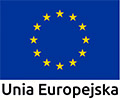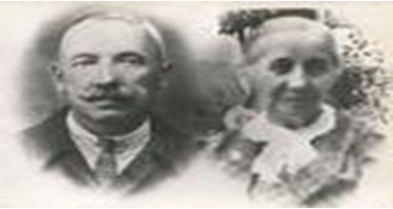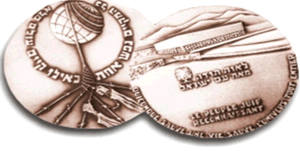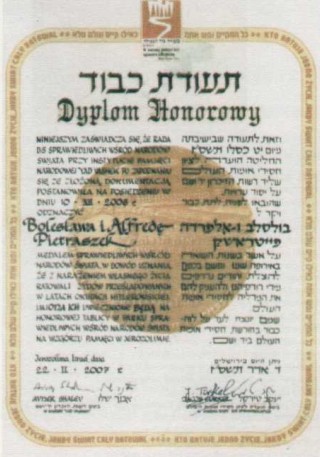The Righteous from the Treblinka area – Alfreda and Bolesław Pietraszek
Alfreda and Bolesław Pietraszek lived in the village of Czekanów near Sokołów Podlaski, managing a large farm belonging to the Forest Inspectorate. Alfreda was an educated woman who spoke four foreign languages. Her knowledge of German saved many inhabitants of Czekanów and hidden Jews. Bolesław was a serious man, respected by his surroundings and a great patriot. He grew up in a family with patriotic traditions. His father took part in the January Uprising in 1863. Both of them were righteous people, deep believers loving their fatherland, for whom words – God, Honour and Fatherland meant a lot, which showed in their everyday life. Between 1942 and 1944, the Pietraszek family saved 17 people from the Holocaust by hiding them in their house on the edge of the forest. In September 1942, Jews were deported from the ghetto in Sokołów to Treblinka and then some of them fled, like the Kopyto family, first to Repki, then to Łuzki, and then to the Pietraszeks in Czekanów. They stayed there until the liberation of this area from the Nazi occupation in the summer of 1944. As accounted by Ben Cjon Sela, his family fled from Sterdyń ghetto around the same time. One of the rescued was Ben Cjon Sela, who in 1941, as a little boy, was resettled with his family to the ghetto. In order to avoid being deported to the Treblinka death camp, his parents decided to escape from the ghetto, take refuge in the forest, and obtain the necessary means of survival by working for peasants from the surrounding villages. Ben Cjon’s mother tried to find shelter for her son in a monastery. Unfortunately, she was denied shelter because accepting a Jewish child was too risky. However, Alfreda Pietraszek, with whom his mother worked as a dressmaker, had the courage to accept the boy into her own home. Shortly afterwards, the whole Ben Cjon’s family also found shelter with the Pietraszeks: from his grandfather to his five children (Shmulak, Dawid, Hershel, Itshak, Matlas), Moshe’s son-in-law Solarz (Matlas’ husband) and one grandson, Ben Cjon Solarz. A special hiding place was built in the attic of the stable, to which Alfreda and Bolesław brought food. Kazimierczuk, Piotrowski, Olszewski and Kocielnicka from Czekanów as well as Miściorak and Przechodzeń from Łuzki knew about the hidden Jews. To this day, above Ben Cjon’s bed hangs a portrait of his rescuers – the Righteous Among the Nations, who selflessly decided to risk their own lives to help others.
Another example of the selfless help of the Pietraszek family is Shaul Kopyto, whom they and their family hid in the attic. He remembered the prayer “Our Father” and said the prayer that Alfreda Pietraszek taught him as a 4-year-old boy. In his memory, the Pietraszek family and their servant will remain marvellous people.
For two years, the Pietraszeks hid 18 people, almost all of whom survived the war. They included:
1. Hawa Przepiórkowa with two children,
2. Landerowa with daughter Genia,
3. Józef Kopyto with wife Perla, son Shaul and his second son, who died while his mother was silencing him with a pillow during German searches. They were refugees from the Sokołów ghetto, who first found a job at the estate of the Dernałowicz family in Repki, then stayed at the estate of the Tyborowski family in Łuzki for two weeks, but here the supervisor of the estate was a German and it was dangerous, so the Pietraszek family provided them with shelter.
4. Moshe Miedzyński, who had previously lived in Łuzki (a village near Czekanów) and ran a grocery shop and leased a fruit orchard from the Pietraszek family. In 1942, he escaped from the ghetto in Sterdyń together with his children Shmulak, Dawid, Hershell, Itshak, Matlas and her husband Moshe Solarz and their son Benek (in Israel – Ben Cjon Sela).
For Alfreda and Bolesław Pietraszek the most important thing was the man and help in the face of danger. The life of Alfreda and Bolesław can be summed up with a saying: “A man is worth as much as he can help others”.
The Yad Vashem Institute decided to award the title of the “Righteous Among the Nations” to ALFREDA and BOLESŁAW PIETRASZEK, who in the years 1942-1944 saved 17 people from the Holocaust in the village of Czekanów near Sokołów Podlaski.
The material prepared on the basis of:
Fr. H. Sączek, M. Snopek, L. Tabor – Czy ja bym na ich miejscu tak uczynić mógł?, Czekanów 2008,
Speeches from the popular science session of 21.09. 2008
– Grażyna Panfil-Rogińska
– Jolanta Okulicz-Kozaryn
ALFREDA AND BOLESŁAW PIETRASZEK IN FAMILY MEMORIES
Memories of Jolanta Okulicz-Kozaryn, the daughter of Bolesław’s sister, Sabina née Pietraszek
When the war broke out, the Pietraszeks were 60 years old, they were a childless, peaceful, religious match, so the fact that they kept 18 people was not a coincidence, bravado, but a conscious decision of mature people.
Our uncle Bolesław Pietraszek grew up in a family with patriotic traditions. His father was a January Uprising insurgent. In 1863, when the uprising broke out, Bolesław’s father, and our grandfather, was 17 years old, and this is not the only case when the Pietraszeks appeared at the call of the Fatherland.
Antonina Alfreda née Kucharska and Bolesław Pietraszek got married on 17 July 1920. More or less at the same time his younger brother Marian volunteered to the 4th Regiment of Podhale Rifles. He died on 22 September 1920 in the Polish-Bolshevik war in the battle at Grodno on the Indura river. He was posthumously awarded the Virtuti Militari cross for his bravery.
Alfreda and Bolesław Pietraszek lived in the Czekanów estate near Sokołów Podlaski. The estate covered 100 ha [As it stems from the comments of Fr. H. Sączek based on interviews with the inhabitants of Czekanów, the Pietraszeks’ estate covered 45 ha – the footnote of the Museum of Struggle and Martyrdom in Treblinka].
During the war uncle and aunt took in and kept 18 people of Jewish origin, 17 of whom survived. One infant died in tragic circumstances. When the Germans came to the estate for a levy, Alfreda, who knew the German language well, negotiated with them, blocking the door to the barn. At that time, those hiding in fear of detecting their hiding place silenced the infant – the child did not survive. One of the rescued, Mr Szaul Kopyto, who was 4 years old then, remembers the death of the child. A barn, a stable, an attic and the basement of the house were used as hiding places in the house. From the account of the survivor Ben Cjon Sela, we know that before leaving Poland, grateful for saving their lives, they wanted to give gold and jewellery to the Pietraszeks as a present, but the couple refused to accept this gift. The aunt believed that they should take these things with them to Israel.
After the liberation, the survivors wrote a letter to the State Council asking for the land to be left to the Pietraszeks couple, as it was already known about the agricultural reform. However, the property was divided up, and the Pietraszeks received 5.25 ha, which they lived off until their death.
Alfreda and Bolesław Pietraszek survived 27 robbery attacks. In the area there was a known fact that they kept Jews and they were expected to have gold. Due to the attacks, they had to move to the village of Jabłonna Lacka, where they lived until their death [According to the information gathered by Fr. H. Sączek, based on the accounts of the inhabitants of Czekanów and the Żółkowskis, who took care of the Pietraszeks, shows that all the time the Pietraszeks lived in Czekanów, where they were buried in the local cemetery – the footnote of the Museum of Struggle and Martyrdom in Treblinka]. They died almost simultaneously in 1965 in great poverty. The village of Czekanów and the Pietraszeks’ grave were visited by Shaul Kopyto from the USA, who was hiding in the attic, and by Ben Cjon Sela, who was six months old when he stayed in the stable. The stable is still standing today and the barn is new.
Speech by Jolanta Okulicz-Kozaryn from the ceremony of awarding the medal of the Righteous Among the Nations to Alfreda and Bolesław Pietraszek, 25.09.2007, Olsztyn
The memory of Grażyna Panfil-Rogińska, who, together with her mother Zofia, mainly contributed to the preservation of the memory of the Pietraszeks, writing to the Yad Vashem Institute in 1981.
I have known this story since I was a child. My mother took great care not to forget it, but it was difficult for me to believe her. How could 18 people be kept hidden for several years, risking their lives every day? It was beyond my imagination.
In 1998, I travelled with my mother to Czekanów and saw the buildings. We also talked to a man whose father was a physical worker at the estate. He was aware of the fact that the Jews were kept hidden. He also confirmed the circumstances of the infant’s death.
Now I would like to talk about two telephone conversations that I have had in recent days.
The first one was with Mr Shaul Kopyto from the USA. He said that he was very sorry that he could not be present at the ceremony in person. He spoke about how grateful he is for saving his life by Alfreda and Bolesław Pietraszek. He apologised that his rescuers – wonderful people – were not awarded sooner, but after the war he was desperate to forget about everything. After arriving in Israel they were very poor, his father died when he was 34 years old. He himself got to the university in America. Years passed and he couldn’t forget. He remembered the prayer “Our Father” and said the prayer that Alfreda Pietraszek taught him as a 4-year-old boy. Finally, he and his son came to Poland.
The second phone call was on the eve of the ceremony. It was from Mr Ben Cjon Sela from Israel, who was 6 months old when he lived with his mother in Czekanów. He said that they had escaped from the ghetto in Łyski, that Alfreda Pietraszek asked his mother what would happen when the work in the field would end, and she herself suggested that they should hide in their estate [According to Fr. H. Sączek: the Miedzińskis, i.e. grandfather and siblings of Ben Cjon Sela’s mother lived in Łuzki before the war, from where they were resettled to the ghetto in Sterdyń, from which they later escaped – the footnote of the Museum of Struggle and Martyrdom in Treblinka]. He expressed his great gratitude for saving his life – selfless, because the Pietraszeks did not accept the gold offered to them. He told us that he knew everything from his mother, now 88 years old, and wrote about it to the Institute 10 years ago, but it did not bring any results. A year ago he fell seriously ill and wrote again. It was then that his story was associated with my mother’s letter. He also spoke of the fact that all his life “he had a portrait of Alfreda and Bolesław over his head”. The conversation was in English and I thought it was a metaphor. It was only after reading the materials from Yad Vashem I realised that it was not a metaphor – in fact, a portrait of his rescuers was hanging above his bed.
A fragment of Grażyna Panfil-Rogińska’s speech from the ceremony of awarding the medal of the Righteous Among the Nations to Alfreda and Bolesław Pietraszek, 25.09.2007, Olsztyn
ABOUT THE PIETRASZEKS IN REGIONAL NEWSPAPERS
Awarded with the medal of the Righteous Among the Nations, now honoured in their hometown of Czekanów
They remember about the Pietraszeks
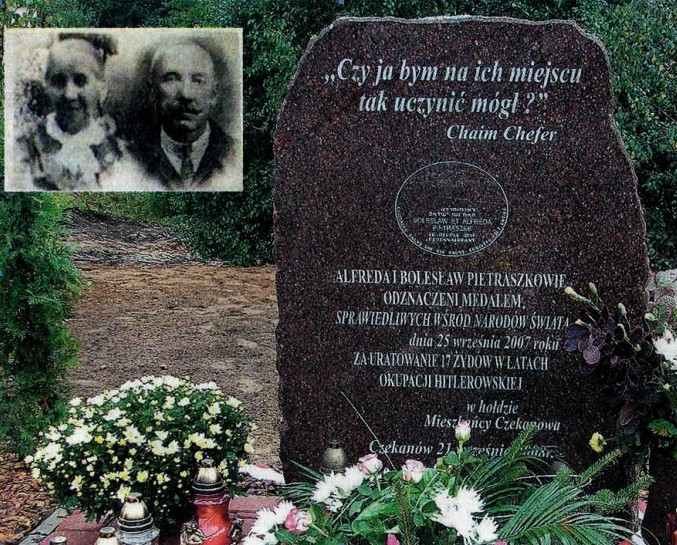
When Alfreda and Bolesław Pietraszek from Czekanów risked their own lives to save eighteen escapees from the Sokołów ghetto, they did not think about the persecution that awaited them after the war. They also did not expect that they would be posthumously awarded the Medal of the Righteous Among the Nations. The phenomenon of the history of people like them is that they helped others selflessly. That is why the inhabitants of their hometown of Czekanów decided to commemorate them – first they rediscovered their history and then they funded a memorial plaque.
Fr. Henryk Sączek, the priest of the Czekanów parish discovered the story of the Pietraszeks while working on the parish chronicle. Two women living in Czekanów – Maria Snopek and Ludwika Tabor helped him to find information [According to Fr. H. Sączek: both women never lived in Czekanów, but in Władysławowo (near Czekanów), and have been living in Warsaw for over 50 years – the footnote of the Museum of Struggle and Martyrdom in Treblinka]. Looking for witnesses to the events of the past, this three-person team of researchers made contact with the Jews harboured by the Pietraszek couple: Shaul Kopyto living in the USA and Ben Sela from Israel.
In 1981, Sabina Pietraszek, the niece of Bolesław Pietraszek, tried to interest the contemporary with the merits of the Pietraszeks [According to Fr. H. Sączek: the niece of Bolesław Pietraszek was Zofia Panfil, the daughter of Sabina Pietraszek – the footnote of the Museum of Struggle and Martyrdom in Treblinka]. However, she did not manage to gather evidence in the form of testimonies of witnesses.
One of the surviving Jews, Ben Sela, decided to describe the story. In 1998, he applied to Yad Vashem (Institute for the Remembrance of Martyrs and Heroes of the Holocaust in Israel) for awarding the Medal of the Righteous Among the Nations to the Pietraszeks.
THE STORY AS IF IT WAS FROM A FILM
The research carried out by the parish priest and his two assistants was conducted independently of Ben Sela’s activities. When the three researchers from Czekanów made contact with him, he not only provided them with a lot of new information, but he also contacted witnesses. It was through Ben Sela that all three of them were invited to Olsztyn for the ceremony of posthumously awarding the Pietraszeks with the Medal of the Righteous Among the Nations.
Maria Snopek, Ludwika Tabor and Fr. Henryk Sączek put the effects of their searches on paper. All they found out was written down in a brochure entitled “Would I be able to do the same in their place?”
The material gathered by the chroniclers shows that the house of the Pietraszeks stood on the edge of the village. Adela Tchórznicka from Sabnie and a maid Aleksandra Kokot and her daughter Olesia lived with the Pietraszek couple. The Pietraszeks were childless. When the war broke out, the hosts were already mature people.
The Jews lived for two years in their barn, cowshed and pig pens.
To feed the people they sheltered, Alfreda and Bolesław Pietraszek relied on assistance from their neighbours [According to the information gathered by Fr. H. Sączek: meals were prepared by the Pietraszeks themselves, and flour for bread was supplied by a person named Przychodzeń – the footnote of the Museum of Struggle and Martyrdom in Treblinka]. First, meals were prepared at home and, as pet food, carried in buckets to farm buildings. Later, not wanting to arouse suspicion, the Pietraszeks began to cook meals for Jews in the barn. All activities, such as washing and sewing clothes, were carried out at night. Only then and for a short time could the Jews go outside.
Only one child did not survive the war. His mother inadvertently smothered the child with a pillow in order to stop the crying when the German patrol was passing nearby.
None of the village inhabitants gave away the Pietraszeks. After the war they didn’t want to accept money or gifts from any of the people, whom they saved their lives.
After the war they were assaulted and robbed many times. The bandits thought that they got rich on Jews. During one of the assaults, someone threw a grenade into their house, which injured Mr Bolesław. They both died in 1965.
HONOURED YEARS LATER
Celebrations dedicated to the memory of the Pietraszeks took place in Czekanów on 21 September 2008. It started with a mass, after which all participants of the celebrations went to a memorial plaque dedicated to the Pietraszek couple. The whole rural community gathered on the spot. A student of the local school, Agnieszka Połosa, recited a poem “Righteous Among the Nations” by Haim Heffer, and the daughter of Józefa Żółkowska, who took care of the Pietraszeks before their death, laid flowers in front of the plaque. The plaque was unveiled by Fr. Henryk Sączek, mayor of Jabłonna Lacka Grzegorz Popowski and the mayor of Czekanów – Jarosław Siemieniak [According to Fr. H. Sączek: it was Józefa Żółkowska’s daughter who unveiled the plaque in the company of Fr. H. Sączek, Mr G. Popowski – the commune mayor, and Mr J. Siemieniak – the village leader of Czekanów, and then seven delegations laid flowers under the plaque – the footnote of the Museum of Struggle and Martyrdom in Treblinka]. The plaque was consecrated by Fr. Eugeniusz Borowski. The second part of the celebrations, in the building of the Primary School was organised by the Head Office of the School, parish and the Sokołów Social and Cultural Society. The following people talked about the story of the Pietraszeks and Czekanów: Maria Snopek, Fr. Henryk Sączek, Wanda Wierzchowska and mayor Grzegorz Popowski.
Text and photos. JUSTYNA PYCKA, Tygodnik Siedlecki No. 41 dated 12.10. 2008
The discrepancy in the transcription of forenames and surnames results from the English and Polish transcription.
Posthumously decorated with the Commander’s Cross of the Order of Polonia Restituta
Alfreda and Bolesław Pietraszek were posthumously awarded by President of the Republic of Poland Prof. Lech Kaczyński with the Commander’s Cross of the Order of Polonia Restituta for hiding seventeen Jews during the German occupation in 1942-1944.
On 9 February 2010 in Rzeszów, the following people received the medal from the hands of the First Lady Maria Kaczyńska: Maria Snopek and Fr. Henryk Sączek – initiators and executors of recording the memory of the heroes of Czekanów. The ceremony was organised by the Chancellery of the President of the Republic of Poland, the Rzeszów branch of the Institute of National Remembrance and the Marshal’s Office in Rzeszów under the name “Save from oblivion”.





